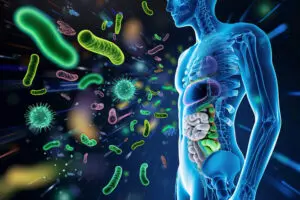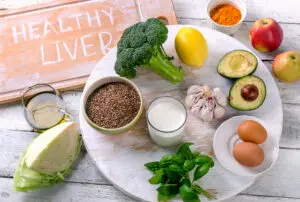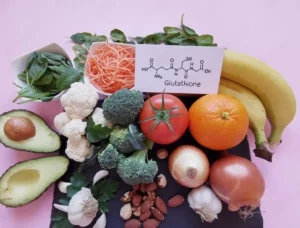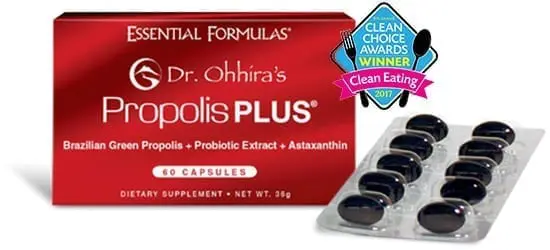By Ross Pelton, RPh, PhD, CCN
Scientific Director, Essential Formulas
Until recently, most dietary advice from health and nutrition experts has been focused on meeting daily macronutrients (proteins, fats & carbohydrates) and micronutrients (vitamins, minerals, amino acids & essential fatty acids) needs. For a long time, it has been all about what food & nutrition does for us. However, how we evaluate the health effects of the foods we eat is undergoing a significant paradigm shift.
The paradigm shift I’m referring to is happening due to our increasing understanding, over the past several decades, of the human gut microbiome’s fundamental role in regulating many aspects of human health. The human gut microbiome is estimated to contain from 500 to 1,000 species of bacteria and a total population of approximately 100 trillion bacteria.
In addition to meeting our own nutritional needs, we must realize that every time we eat, we are feeding 100 trillion bacteria in our gastrointestinal tract. If you don’t feed your probiotic bacteria well, they will not thrive and survive. The primary nutrients or foods that probiotic bacteria require are dietary fibers and polyphenols.
Humans do not possess the enzymes to digest dietary fibers. Polyphenols are a large group of compounds (over 8,000 have been identified) that occur in plants. Most polyphenols are also giant molecules that humans cannot digest very well. Hence, dietary fibers and most polyphenols pass through the digestive tract unchanged. However, when they reach the colon, they are the food for your probiotic bacteria.
Probiotic bacteria’s primary ‘job’ is metabolizing dietary fibers and polyphenols. Probiotic bacteria break these large compounds, which results in the production of more minor compounds that are referred to as postbiotic metabolites. Postbiotic metabolites have a great deal of biological activity. In addition to regulating the microbiome ecosystem’s health, many also get absorbed and influence other organ systems throughout the body. Hence, we have a gut-brain axis, a gut-heart axis, a gut-skin axis, a gut-liver axis, etc.
A healthy microbiome consists of approximately 85-90% good (probiotic) bacteria and only small numbers of harmful bacteria. Everyone has some bacteria that can potentially cause harm. However, problems generally do not occur when good bacteria vastly outnumber harmful bacteria. However, when people develop a bacterial imbalance called dysbiosis, they frequently develop symptoms such as gas, bloating, diarrhea, constipation, pain, and inflammation. These symptoms are primarily the result of not having enough postbiotic metabolites produced.
Diversity and balance are critical factors for a healthy microbiome. Diversity means having a wide range of different species of probiotic bacteria in your intestinal tract. Balance refers to having the correct number of various strains of probiotic bacteria. Products that contain high amounts of probiotic bacteria (10s or 100s of billion bacteria/dose) work AGAINST diversity and balance.
My top recommendations are for creating and maintaining a healthy microbiome. My mantra is to consume a little bit of many different foods. The primary goal is to ingest a small amount of many different types of plant-based foods every day.
- Diet is the #1 factor that influences the microbiome. Plant-based foods are the best source of dietary fibers and polyphenols to support a healthy microbiome. Fruits and vegetables are the best sources, followed by whole grains, nuts, seeds, herbs, and spices. However, numerous studies reports that 90-95% of American children and adults DO NOT consume adequate amounts of plant-based foods. Thus, most people probably do not have an optimally healthy microbiome. This means most people probably have digestive problems, which can cause or contribute to many other health problems.
- I encourage people to watch my 8-minute YouTube video, Ross’ Salad Buzz. In addition to saving a lot of time, my Salad Buzz contains 16 different types of vegetables. This provides your probiotic bacteria with a wide diversity of dietary fibers and polyphenols, which supports a healthy microbiome. Vegetables. The ingredients in my Buzz Salad can change seasonally as different types of vegetables become available.
- My protein smoothie. I frequently make a protein shake or smoothie with various frozen fruits in my blender. I purchase bags of mixed frozen fruits from my local health food store. In addition to a scoop of protein powder, my smoothie contains mangos, blueberries, blackberries, raspberries, strawberries, cherries, peaches, pineapple, grapes, and cranberries. Like the Salad Buzz, the ingredients may vary based on the seasonal availability of fruits. Also, of course, you don’t have to use frozen fruits. That happens to be my choice. I also usually add 1/2 an avocado to my smoothie because the fat slows down the absorption of sugars, which reduces the duration and degree of blood sugar spikes from the fruit sugars.
- Dr. Ohhira’s Probiotics are a critical recommendation I make for maintaining a healthy microbiome. The gut microbiome is a critically important regulator for many aspects of health, and I think people should take proactive steps to support a healthy microbiome. Remember, most gut problems are due to a lack of postbiotic metabolites. Dr. Ohhira’s Probiotics is the BEST product to support a healthy microbiome because each dose contains over 500 postbiotic metabolites. This is the fastest and most efficient way to relieve symptoms and elicit beneficial changes in the gut microbiome.
Dr. Ohhira’s Probiotics are produced in a multi-year fermentation process. A wide range of Japanese fruits, vegetables, mushrooms, and seaweeds are added to 80-gallon fermentation vats and 12 starter strains of probiotic bacteria. Bacteria break down the dietary fibers and polyphenols in the foods, producing the wide range of postbiotic metabolites that Dr. Ohhira’s Probiotics contain. The fermentation process that Dr. Ohhira developed mimics the natural fermentation processes in the colon, producing postbiotic metabolites. Many people get fast relief from intestinal symptoms when they take Dr. Ohhira’s Probiotics. This is what we call the Dr. Ohhira’s Difference.
In 2022, the results of a human clinical trial with Dr. Ohhira’s Probiotics reported that all participants who consumed Dr. Ohhira’s Probiotics experienced significant reductions in fatigue and increased energy levels. All participants in this anti-fatigue trial were healthy individuals with no known diseases before enrolling.






